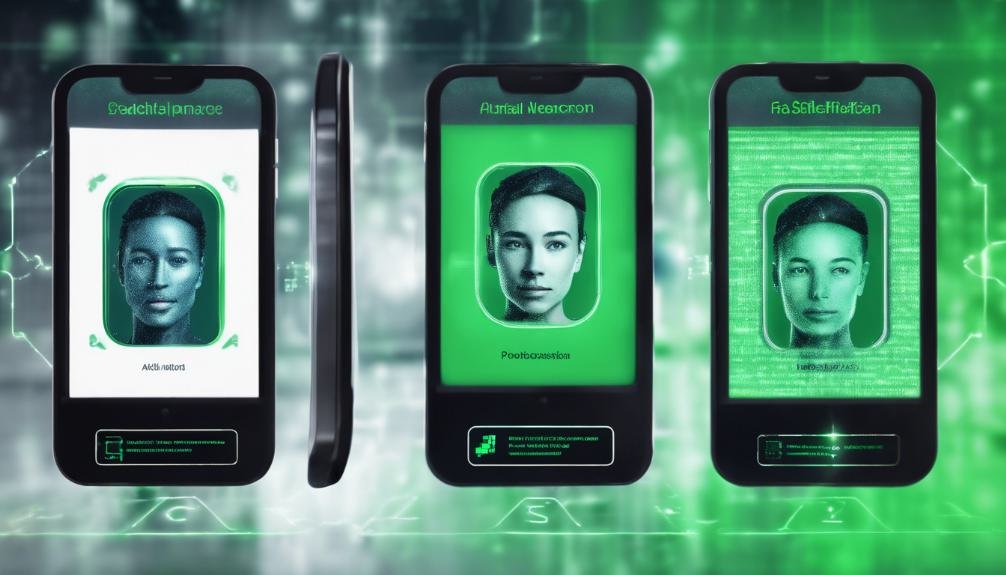AI for Identity Verification
When it comes to identity verification, the traditional methods often fall short in today's fast-paced digital landscape. But, imagine a world where AI seamlessly streamlines the authentication process while enhancing security measures. The ability of AI to adapt and evolve in real-time offers a glimpse into a future where identity verification is not only efficient but also incredibly secure. Let's explore how AI is revolutionizing identity verification and what implications this holds for the future of secure transactions and interactions.
Key Takeaways
- AI utilizes multiple data points for accurate verification.
- Machine learning speeds up identification processes.
- Customizable security measures enhance robustness.
- AI reduces fraud risks through anomaly detection.
- AI advancements enhance biometric technology for verification.
Enhanced Identity Verification Accuracy
To guarantee peak accuracy in identity verification processes, AI systems must consistently analyze and cross-reference multiple data points with high precision and efficiency. Machine learning algorithms play an essential role in enhancing the accuracy of these systems. By continuously learning from new data inputs, these algorithms can adapt and improve the verification process over time, reducing errors and false positives.
Furthermore, enhanced data protection is vital in maintaining the accuracy of identity verification. AI systems must make sure that sensitive information is securely stored and processed to prevent unauthorized access or data breaches. Implementing robust encryption techniques and access controls can greatly reduce the risk of data leaks, safeguarding the integrity of the verification process.
Faster Verification Process With AI
Maintaining an efficient identity verification process is inherently tied to the speed at which AI systems can verify individual identities. Machine learning algorithms play a vital role in enhancing the verification process by enabling quick and accurate identification.
By utilizing these algorithms, AI systems can swiftly analyze vast amounts of data and patterns, allowing for rapid verification while maintaining high levels of accuracy.
Streamlined processes further contribute to expediting the verification process. Through the automation of routine tasks and the elimination of manual interventions, AI can greatly reduce the time required for identity verification. This not only enhances operational efficiency but also improves the overall user experience by providing swift verification results.
However, it's crucial to make sure that the speed of verification doesn't compromise the accuracy and security of the process. While aiming for faster verification, it's important to maintain robust security measures to protect sensitive information and prevent fraudulent activities.
Balancing speed with accuracy is key to achieving an efficient identity verification process powered by AI.
Customizable Security Measures
Implementing adaptable security measures is crucial for enhancing the robustness of the identity verification process. Customizable settings allow for personalized security levels tailored to the specific needs of users. By incorporating customizable security measures, organizations can better address varying levels of risk and user preferences.
Customizable settings enable users to choose security features that align with their comfort levels, providing a sense of control over their verification process. This personalization can range from selecting specific biometric data for verification to setting up multi-factor authentication based on individual preferences.
Moreover, personalized security levels not only improve user experience but also contribute to overall security. By allowing users to adjust security settings according to their needs, organizations can strike a balance between usability and protection. This flexibility ensures that security measures remain effective without causing unnecessary friction for users.
Reducing Fraud Risk With AI
When it comes to reducing fraud risk with AI, it's essential to examine the effectiveness of fraud detection strategies.
AI implementation offers significant benefits in terms of improving security measures and minimizing potential risks associated with fraudulent activities.
Fraud Detection Strategies
To strengthen your fraud detection efforts and effectively reduce the risk of fraudulent activities, incorporating artificial intelligence (AI) into your identity verification processes is essential. By leveraging machine learning and pattern recognition, AI can analyze vast amounts of data to identify suspicious patterns and anomalies that may indicate fraudulent behavior.
Behavioral analysis plays a vital role in fraud detection strategies, as AI can detect deviations from typical user behavior, flagging them for further investigation.
Anomaly detection is a powerful tool in fraud prevention, allowing AI systems to recognize irregular activities that may suggest fraudulent actions. Through continuous learning and adaptation, AI can stay ahead of evolving fraud tactics, providing real-time insights to help mitigate risks effectively.
AI Implementation Benefits
By harnessing the capabilities of artificial intelligence (AI) in your identity verification processes, you can greatly reduce fraud risks through advanced data analysis and anomaly detection. AI efficiency improvements enable real-time assessment of multiple data points, swiftly flagging any inconsistencies or suspicious activities. This proactive approach enhances fraud prevention by quickly identifying potential threats before they escalate.
Streamlined verification processes are another significant benefit of AI implementation. Automation of routine tasks such as document verification and biometric checks not only saves time but also reduces the margin for human error, ensuring a more reliable verification process.
Additionally, AI algorithms can adapt and learn from new fraud patterns, continuously improving security measures to stay ahead of evolving threats.
AI Biometric Technology Advancements
You'll find that the current advancements in AI biometric technology are revolutionizing the accuracy of facial recognition systems and the innovation in voice authentication methods.
These developments are essential for enhancing security measures and ensuring reliable identity verification processes.
The integration of these cutting-edge technologies signifies a significant step forward in the evolution of identity authentication techniques.
Facial Recognition Accuracy
With advancements in AI biometric technology, the precision of facial recognition systems has markedly improved, raising important considerations regarding its reliability and ethical implications.
Despite progress, facial recognition still grapples with limitations and biases. Algorithms may be less accurate when identifying individuals with darker skin tones, leading to potential discriminatory outcomes. This bias poses a significant challenge to the technology's widespread adoption and underscores the need for continuous refinement to guarantee fairness and inclusivity.
Privacy concerns and data protection also loom large in the domain of facial recognition accuracy. The collection and storage of vast amounts of facial data raise questions about how this information is safeguarded and whether it could be misused or compromised.
Striking a balance between the convenience and security offered by facial recognition and the protection of individual privacy rights remains a critical task for developers and regulators alike. As the technology evolves, addressing these challenges will be paramount in fostering trust and acceptance among users.
Voice Authentication Innovation
Innovations in voice authentication technology powered by AI are revolutionizing biometric security measures, enhancing both accuracy and user experience. Voice recognition, a sophisticated form of biometric authentication, is gaining traction due to its convenience and effectiveness.
By analyzing unique vocal patterns and characteristics, AI-driven voice authentication systems can verify a user's identity with a high degree of accuracy, greatly reducing the risk of unauthorized access.
One of the key advantages of voice authentication is its seamless integration with cybersecurity protocols. By combining voice recognition with other security measures like passwords or two-factor authentication, organizations can create multi-layered defense mechanisms against potential breaches. This synergy between voice recognition and cybersecurity enhances overall system resilience and safeguards sensitive data more effectively.
As voice authentication technology continues to evolve, it's important for organizations to stay informed about the latest advancements and best practices in implementing these systems.
Seamless User Experience Integration
Efficiently integrating seamless user experience into AI identity verification systems requires a meticulous balance between security and ease of use. The user interface plays a critical role in ensuring accessibility for individuals from various backgrounds while maintaining high levels of data privacy. When designing these systems, it's essential to prioritize user engagement to enhance the overall experience.
User interface design should focus on simplicity and intuitiveness to guide users through the verification process smoothly. Accessibility features such as clear instructions, visual cues, and easy navigation can help users complete the verification quickly and accurately. However, this must be done without compromising on the stringent data privacy measures required to protect sensitive information.
Balancing security with a seamless user experience is a delicate task. It involves implementing robust identity verification processes while ensuring that users feel comfortable and engaged throughout the process. By prioritizing both security and ease of use, AI identity verification systems can deliver a user-friendly experience without compromising on data privacy.
Scalable Solutions for Businesses
Scaling your AI identity verification system for business applications requires a strategic approach that balances growth with performance and reliability. AI scalability is important to meet increasing demands efficiently.
Implementing a scalable solution not only enhances identity verification processes but also impacts overall business performance positively.
By investing in scalable AI technology, businesses can streamline identity verification procedures, leading to improved efficiency and reduced operational costs. Automation benefits such as faster verification times and reduced manual errors can greatly enhance user experience and customer satisfaction.
Additionally, scalable solutions enable businesses to handle growing volumes of verification requests without compromising on accuracy or speed.
The business impact of scalable AI solutions for identity verification can't be overstated. Companies that prioritize scalability in their verification systems are better equipped to handle spikes in demand, adapt to changing requirements, and maintain a competitive edge in the market.
Ultimately, a scalable approach ensures that your identity verification system can grow alongside your business, supporting long-term success and customer trust.
AI Compliance and Legal Considerations
To ensure the successful implementation of AI for identity verification in your business, you must carefully navigate the intricate landscape of compliance and legal considerations. AI compliance isn't just a buzzword; it's a critical aspect that demands your attention.
In the domain of identity verification, the use of AI brings about various regulatory challenges that need to be addressed proactively.
Ensuring AI compliance involves adhering to a myriad of regulations, such as GDPR, CCPA, and other industry-specific standards. Failure to comply with these regulations can result in severe consequences, including hefty fines and reputational damage. Hence, it's imperative to stay abreast of the evolving regulatory landscape and tailor your AI solutions accordingly.
Moreover, handling legal considerations entails understanding the implications of using AI in identity verification processes. Issues such as data privacy, consent, and transparency must be carefully managed to build trust with customers and regulatory bodies.
Building Customer Trust With AI
Establishing trust with customers through transparent communication about AI processes is vital for successful implementation in identity verification systems.
When it comes to building customer trust with AI in identity verification, ensuring data privacy is essential. Customers need to feel confident that their sensitive information is being handled securely and ethically. By prioritizing data privacy and demonstrating a commitment to safeguarding personal data, you can enhance customer satisfaction and loyalty.
Customer satisfaction is closely tied to trust, especially when it comes to identity verification processes that involve AI. Providing clear information about how AI is used in identity verification, the data it analyzes, and the security measures in place can help alleviate any concerns customers may have.
Transparency breeds trust, and trust is the foundation of a strong customer-business relationship.
Conclusion
You've witnessed the evolution of identity verification with AI – from the clunky processes of the past to the streamlined efficiency of today. Embracing this cutting-edge technology hasn't only improved security measures but also enhanced customer trust.
The seamless integration of AI biometric advancements has paved the way for scalable solutions in a rapidly changing digital landscape. As businesses prioritize compliance and legal considerations, the future of identity verification lies in the hands of AI.







